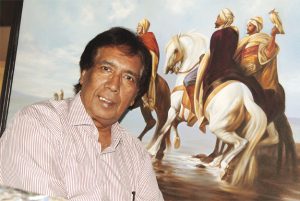Gilgit Baltistan art paintings academy
Gilgit Baltistan most famous atists name's Afzal art, Shakeel art, Nisar art, Yasir nisar and nobal art
 |
| water colour paintings |
 |
| water colour painting shakeel art |
 |
| shigar fort |
S. IQBAL: THE ONLY POSTER ARTIST LEFT FOR LOLLYWOOD
Pakistan seems to be yet too backward when it comes to talking about painters, sculptures, and artists. There are not many that were blessed enough to engrave their names in the minds of people, excluding Gulgee, Shazia Sikander, Ahmed Pervez, Amin Gulgee, Sadequin, and a few more, who became eminent by luck and education. Whereas, there are plenty of other unnoticed artists this land has given birth to, but they are neglected because either they are impoverished or ignorant. Among these unfortunates comes the name of Sarfraz Iqbal, who has years of experience in poster paintings but dismally known to a few.
Sarfraz Iqbal is a legend that has been constantly overlooked in our country. The 68 years old painter has been working as a dedicated artist for Lollywood over several years now, yet his colossal work and paintings have gone unnoticed. Only recently his name came up on different media platforms when he painted the main poster for the movie “Zinda Bhaag”. As flawless as it can be, Iqbal painted the poster so well that it is hard to grasp over the fact that such talented man is a part of our film industry.
His father, Sardar Khan, who was also a great painter of his time, passed on his painting germs to his son. Sardar Khan himself had collaborated in many films in Bombay before the Indo-Pak partition, and that was the time when Sarfraz saw his future in painting, so he learned all the magical strokes from his father until he mastered this profession. Sardar Khan did not only inspire his son, but many other youngsters jumped into the profession of painting during those days mainly because of him.
By: Dr. Muhammad Ahsan Farooqi
Little attention seems to have been paid to the form of Iqbal's poetry. This is perhaps due to the fact that Iqbal himself always looked down upon and even went to the extent of denying the very existence of the "colour and smell of poetry" (رنگ و بوئے شاعری) in his verse. This attitude is not surprising, for it is entirely in the spirit of the Holy Qur'an wherein too there is the essence of the highest poetry along with the condemnation of the mere poets. This again is the way of all thinker-poets of the world, that is, the way of all those national poets who came at a time when the poetry of their nation had degenerated into mere sweet expression. Wordsworth, for example, leaves the world of "eye and ear" and craves for the joy of elevated thought. But this does not mean that they cease to be sensuous artists, makers of pictures and creators of music or the builders of the divine harmony of voice and verse. In fact it is sensuous particularity, the sine qua non of a poet, which is the basis of their personality and their mental make-up. What they mean by playing down this gift is that they do not want to rest at it, but want to employ it in the service of that highest art in which beauty and truth become one. Like them Iqbal has his full share of the "senses" and his basic effort seems to be to make the fullest use of them, but the images he evokes and the music he makes take us to the realm of thought. The total result is the so-called "intellectual fervence" which is the hall-mark of the verse of Rumi, 'Urfi, Goethe, Browning, and Ghalib. Enough has been done to expound his reformist zeal and his philosophical earnestness and thus to prove him a thinker first and a poet afterwards. But the fact remains that in his poem Hour-oSha'ir (Houri and the Poet) when the houri characterises him as a poet the most important point that she emphasises is:
لذت سرود کی ہو چڑیوں کے چہچہوں میں
چشمے کی شورشوں م یںباجا سا بج رہا ہو

No comments:
Post a Comment